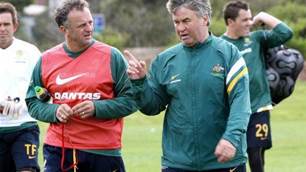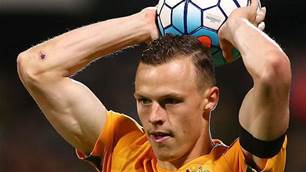GUUS Hiddink may be granted Russian citizenship following Euro 2008 but the Dutchman is refusing to forget how close it was to Steve McClaren being at the finals instead of him.
It was seven months ago England were edged out by a point when Croatia won at Wembley, with Russia given a reprieve after they looked to have thrown away qualification with defeat in Israel the previous Saturday.
Rather than Hiddink's team lighting up this tournament, it would have been McClaren's men in their place - but Russia have seized their chance after opening up their challenge with defeat by Spain.
Now Russia president Dmitri Medvedev looks set to give Hiddink honorary citizenship for reaching the semi-finals, just as South Korea did when he took them to the same stage of the World Cup in 2002.
But Hiddink said: "I'm realistic and won't forget the past.
"Everything is now highlighting us and there is talk about citizenship etc but I don't forget the tough time we had.
"We played well against England at home but also had a difficult game away against Israel, I'm well aware of that.
"I don't get carried away by today's success. It shows you that football is decided on details."
Standing in their way of a final appearance are Spain again, with predictions of a different type of game this time at the Ernst Happel Stadium in Vienna.
Hiddink is hoping this success will help build Russia into a footballing force. Since the break-up of the Soviet Union, it is the first time Russia have made it out of the group stages of a major tournament.
"Fortunately we qualified but if it didn't happen we should still go on with improving the infrastructure," Hiddink added.
"When you don't win you have to improve your strategy and infrastructure. I also recognise that if the national team wins it accelerates those processes.
"You could lean back and say that we did more than expected but that is not the spirit to take into the next games."
Hiddink now feels Russian football is rising again, adding: "It was shown in the UEFA Cup when Zenit St Petersburg won the trophy, they also beat very good teams from Bundesliga, Spanish teams and at the end Glasgow Rangers.
"Russian football is coming alive and so is the national team."
Hiddink also took Australia out of the group stages of the World Cup in 2006 as well as defying the odds with South Korea, but he insists his current challenge is different.
"The big challenge for Australia was to qualify but this was more raw here," he added. "To establish itself and regain where it was in European football. This is momentum and that is the challenge."
Rather than Hiddink's team lighting up this tournament, it would have been McClaren's men in their place - but Russia have seized their chance after opening up their challenge with defeat by Spain.
Now Russia president Dmitri Medvedev looks set to give Hiddink honorary citizenship for reaching the semi-finals, just as South Korea did when he took them to the same stage of the World Cup in 2002.
But Hiddink said: "I'm realistic and won't forget the past.
"Everything is now highlighting us and there is talk about citizenship etc but I don't forget the tough time we had.
"We played well against England at home but also had a difficult game away against Israel, I'm well aware of that.
"I don't get carried away by today's success. It shows you that football is decided on details."
Standing in their way of a final appearance are Spain again, with predictions of a different type of game this time at the Ernst Happel Stadium in Vienna.
Hiddink is hoping this success will help build Russia into a footballing force. Since the break-up of the Soviet Union, it is the first time Russia have made it out of the group stages of a major tournament.
"Fortunately we qualified but if it didn't happen we should still go on with improving the infrastructure," Hiddink added.
"When you don't win you have to improve your strategy and infrastructure. I also recognise that if the national team wins it accelerates those processes.
"You could lean back and say that we did more than expected but that is not the spirit to take into the next games."
Hiddink now feels Russian football is rising again, adding: "It was shown in the UEFA Cup when Zenit St Petersburg won the trophy, they also beat very good teams from Bundesliga, Spanish teams and at the end Glasgow Rangers.
"Russian football is coming alive and so is the national team."
Hiddink also took Australia out of the group stages of the World Cup in 2006 as well as defying the odds with South Korea, but he insists his current challenge is different.
"The big challenge for Australia was to qualify but this was more raw here," he added. "To establish itself and regain where it was in European football. This is momentum and that is the challenge."
Copyright (c) Press Association
Related Articles

Ex-Socceroo: ‘Hiddink still the master’

Smith lifts lid on World Cup snub













